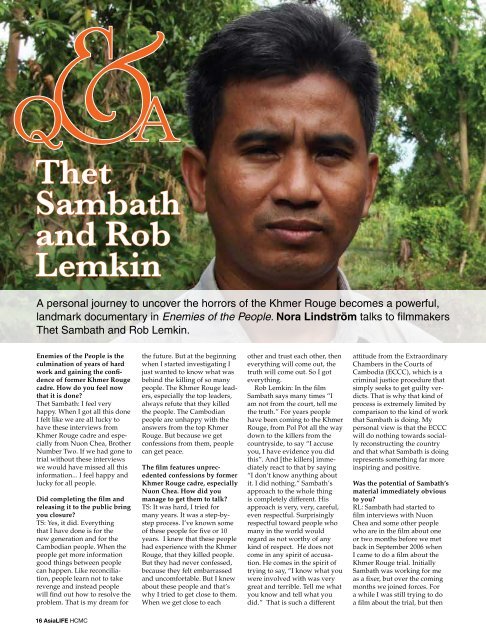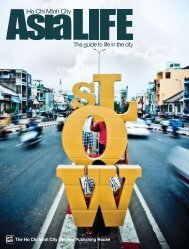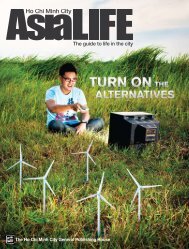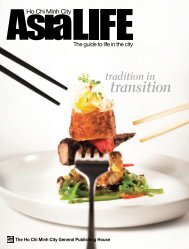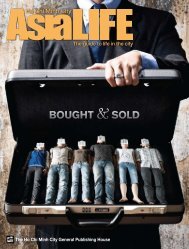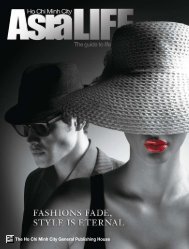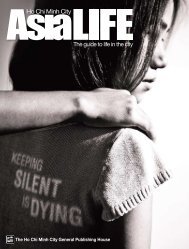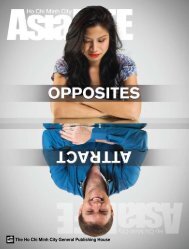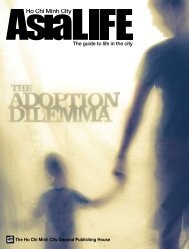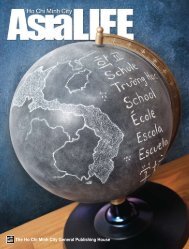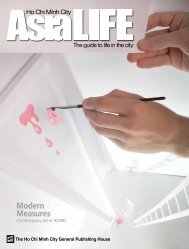Brett Davis - AsiaLIFE Magazine
Brett Davis - AsiaLIFE Magazine
Brett Davis - AsiaLIFE Magazine
Create successful ePaper yourself
Turn your PDF publications into a flip-book with our unique Google optimized e-Paper software.
Thet<br />
Sambath<br />
and Rob<br />
Lemkin<br />
A personal journey to uncover the horrors of the Khmer Rouge becomes a powerful,<br />
landmark documentary in Enemies of the People. Nora Lindström talks to filmmakers<br />
Thet Sambath and Rob Lemkin.<br />
Enemies of the People is the<br />
culmination of years of hard<br />
work and gaining the confidence<br />
of former Khmer Rouge<br />
cadre. How do you feel now<br />
that it is done? <br />
Thet Sambath: I feel very<br />
happy. When I got all this done<br />
I felt like we are all lucky to<br />
have these interviews from<br />
Khmer Rouge cadre and especially<br />
from Nuon Chea, Brother<br />
Number Two. If we had gone to<br />
trial without these interviews<br />
we would have missed all this<br />
information... I feel happy and<br />
lucky for all people. <br />
Did completing the film and<br />
releasing it to the public bring<br />
you closure? <br />
TS: Yes, it did. Everything<br />
that I have done is for the<br />
new generation and for the<br />
Cambodian people. When the<br />
people get more information<br />
good things between people<br />
can happen. Like reconciliation,<br />
people learn not to take<br />
revenge and instead people<br />
will find out how to resolve the<br />
problem. That is my dream for<br />
the future. But at the beginning<br />
when I started investigating I<br />
just wanted to know what was<br />
behind the killing of so many<br />
people. The Khmer Rouge leaders,<br />
especially the top leaders,<br />
always refute that they killed<br />
the people. The Cambodian<br />
people are unhappy with the<br />
answers from the top Khmer<br />
Rouge. But because we get<br />
confessions from them, people<br />
can get peace. <br />
The film features unprecedented<br />
confessions by former<br />
Khmer Rouge cadre, especially<br />
Nuon Chea. How did you<br />
manage to get them to talk? <br />
TS: It was hard, I tried for<br />
many years. It was a step-bystep<br />
process. I’ve known some<br />
of these people for five or 10<br />
years. I knew that these people<br />
had experience with the Khmer<br />
Rouge, that they killed people.<br />
But they had never confessed,<br />
because they felt embarrassed<br />
and uncomfortable. But I knew<br />
about these people and that’s<br />
why I tried to get close to them.<br />
When we get close to each<br />
other and trust each other, then<br />
everything will come out, the<br />
truth will come out. So I got<br />
everything. <br />
Rob Lemkin: In the film<br />
Sambath says many times “I<br />
am not from the court, tell me<br />
the truth.” For years people<br />
have been coming to the Khmer<br />
Rouge, from Pol Pot all the way<br />
down to the killers from the<br />
countryside, to say “I accuse<br />
you, I have evidence you did<br />
this”. And [the killers] immediately<br />
react to that by saying<br />
“I don’t know anything about<br />
it. I did nothing.” Sambath’s<br />
approach to the whole thing<br />
is completely different. His<br />
approach is very, very, careful,<br />
even respectful. Surprisingly<br />
respectful toward people who<br />
many in the world would<br />
regard as not worthy of any<br />
kind of respect. He does not<br />
come in any spirit of accusation.<br />
He comes in the spirit of<br />
trying to say, “I know what you<br />
were involved with was very<br />
great and terrible. Tell me what<br />
you know and tell what you<br />
did.” That is such a different<br />
attitude from the Extraordinary<br />
Chambers in the Courts of<br />
Cambodia (ECCC), which is a<br />
criminal justice procedure that<br />
simply seeks to get guilty verdicts.<br />
That is why that kind of<br />
process is extremely limited by<br />
comparison to the kind of work<br />
that Sambath is doing. My<br />
personal view is that the ECCC<br />
will do nothing towards socially<br />
reconstructing the country<br />
and that what Sambath is doing<br />
represents something far more<br />
inspiring and positive. <br />
Was the potential of Sambath’s<br />
material immediately obvious<br />
to you? <br />
RL: Sambath had started to<br />
film interviews with Nuon<br />
Chea and some other people<br />
who are in the film about one<br />
or two months before we met<br />
back in September 2006 when<br />
I came to do a film about the<br />
Khmer Rouge trial. Initially<br />
Sambath was working for me<br />
as a fixer, but over the coming<br />
months we joined forces. For<br />
a while I was still trying to do<br />
a film about the trial, but then<br />
I became less interested in<br />
that. Then I realized Sambath<br />
had a relationship with Nuon<br />
Chea, and he told me about<br />
his relationship with people in<br />
the countryside, and I thought<br />
that was more interesting. So it<br />
wasn’t an immediate thing. It<br />
was gradual. After about seven<br />
or eight months from when we<br />
started filming, not with Nuon<br />
Chea but with the killers in<br />
the countryside, that’s when I<br />
realized we had a film. Because<br />
although the interviews with<br />
Nuon Chea are the ones that<br />
are newsworthy, the heart of<br />
the film really is the relationship<br />
with the ordinary people<br />
who were involved in this<br />
chain of killing. <br />
The documentary has met<br />
with a lot of success, including<br />
winning the Special Jury Prize<br />
at Sundance and the Grand<br />
Jury Award at the Full Frame<br />
Documentary Festival. Did<br />
you expect so much international<br />
publicity and acclaim? <br />
RL: To be honest, no. When we<br />
started right at the beginning,<br />
it looked like it was just going<br />
to be a half an hour programme<br />
for British TV which would<br />
have been finished a long<br />
time ago. And maybe even<br />
forgotten about a long time<br />
ago too. Gradually, it became<br />
possible to widen the scope of<br />
the film so that it had more profound<br />
content. The universal<br />
aspect of the story—of good<br />
and evil, of repentance, of the<br />
horror of mass killings, and the<br />
idea of a victim coming to see<br />
the people who destroyed his<br />
world as a child and coming in<br />
a genuinely open and almost<br />
tolerant sprit in the interest<br />
of getting a deeper story, a<br />
deeper truth out of it all—that<br />
has got a wider theme. It’s<br />
not just about Cambodia and<br />
I think that’s why the film–in<br />
pretty much every country–has<br />
been so well received and won<br />
prizes. <br />
The documentary’s screening<br />
in Cambodia took place just<br />
before Duch’s verdict was anticipated.<br />
Was this your plan? <br />
RL: Yes. It was intentional to<br />
have it around this time. The<br />
court has tried to subpoena<br />
the film as evidence in the case<br />
against Nuon Chea. We’ve<br />
resisted that and have come<br />
under some criticism from the<br />
court for that because I don’t<br />
think they have appreciated the<br />
nature of proper journalism.<br />
When you have a relationship<br />
with someone who is giving<br />
you some very vital information,<br />
you get that information<br />
from the person on a certain<br />
basis. You can’t then turn<br />
around to a court process and<br />
hand over that information to<br />
them. They’ve accused us of<br />
letting the Khmer Rouge walk<br />
free. Our line would be that<br />
if you have 2 million dollars,<br />
which is 1.99 million more than<br />
we have, you can do your work<br />
and get your own information.<br />
It’s not our problem if you can’t<br />
convict these people. <br />
[The court] is not interested<br />
in reconciliation. They’re not<br />
interested in seeing this society<br />
go forward in any kind of way.<br />
We’re showing it here now<br />
partly also because it is opening<br />
next week in America, and we<br />
wanted to release it here before<br />
anywhere else because this is<br />
the most important place. We<br />
originally wanted to show it<br />
earlier but the government<br />
refused us permission. Ideally<br />
we would have showed it in a<br />
big cinema with thousands of<br />
Cambodians coming to see it,<br />
but we didn’t get permission to<br />
do that. In the future we would<br />
like to show the film around the<br />
Cambodian countryside. Even<br />
the guys who did the killings<br />
want the film to be shown all<br />
around Cambodia. <br />
What do you hope audiences,<br />
especially Khmer viewers, will<br />
take away from the film? <br />
TS: I think that after they see<br />
the film they will get some<br />
knowledge and some people<br />
can understand and they can<br />
feel better from the confession.<br />
Because for many years it has<br />
been hard to get confessions,<br />
especially from Khmer Rouge<br />
leaders and the people who<br />
did the killings. I’m waiting for<br />
their reactions.<br />
16 asialife HCMC asialife HCMC 17


